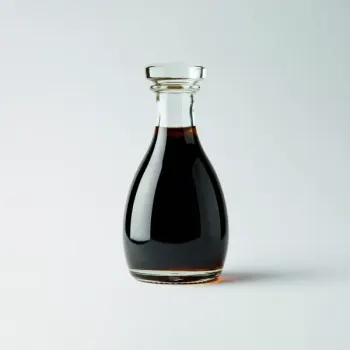Balsamic Vinegar vs Vinegar are ingredients with distinct flavors used in cooking. Balsamic is sweet and syrupy, aged in barrels, ideal for reductions and marinades. Regular vinegar is tangy, great for dressings and pickling. Each has unique culinary applications and can sometimes be substituted with adjustments.

Balsamic vinegar is a dark, concentrated, and intensely flavored vinegar originating from Italy. Made from grape must, which is freshly crushed grape juice with all the skins, seeds, and stems, it is aged for several years in a series of wooden barrels, which imparts complexity and richness to its flavor.

Vinegar is a versatile liquid that is made by fermenting ethanol alcohol with a bacterium called Acetobacter. This process turns the alcohol into acetic acid, which gives vinegar its characteristic tangy taste. Vinegar comes in many types, including white, apple cider, red wine, and rice vinegar, each with its unique flavor profile and use in cooking.
Balsamic vinegar differs from other types of vinegar in its sweet, rich flavor and syrupy consistency. It is usually aged for many years, which contributes to its complex taste, whereas other vinegars like white or apple cider vinegar have a more straightforward acidic taste and a thinner consistency. Balsamic vinegar is also typically more expensive due to its lengthy aging process and artisanal production methods.

Your ultimate Recipe Box, Meal Planner, and Cooking Class all in one
Best used in Caprese salad, spinach and strawberry salad, or a rocket and parmesan salad. Balsamic vinegar adds a sweet and mellow flavor to dressings and can be reduced to a glaze for a more intense taste. It pairs well with olive oil and enhances the flavors of the fresh ingredients. Suitable for a wide variety of salads, from classic garden salads to coleslaw. Different types of vinegar, such as apple cider or red wine vinegar, can be used to create tangy, zesty salad dressings. They're ideal for cutting through the richness of oily dressings or mayonnaise-based sauces.
Excellent for marinating meats like steak or chicken, as it tenderizes the meat and adds a depth of flavor. Balsamic vinegar can also be used in vegetable marinades for grilling, giving a caramelized and slightly sweet finish. Acidic vinegars like white or apple cider vinegar are great for seafood marinades or pickling brines. They can also be used in meat marinades to add a sharp tang and help tenderize tougher cuts.
Ideal for making reduction sauces for meats or a drizzle for roasted vegetables. It can also be used to add sweetness and body to tomato-based sauces or to deglaze a pan. Used to add acidity and brightness to sauces like vinaigrettes, gastriques, or even tomato sauces. A splash of vinegar can balance the flavors in a rich sauce or cut through the fat in creamy sauces.
Balsamic vinegar and other types of vinegar have minimal differences in their nutritional content, but balsamic vinegar may contain more natural sugars due to its grape base.
| Nutrient | Vinegar ( per Tablespoon ) | Balsamic Vinegar ( per Tablespoon ) |
|---|---|---|
| Fat | 0g | 0g |
| Sodium | 1mg | 4mg |
| Calcium | 1mg | 4mg |
| Protein | 0g | 0g |
| Calories | 3 | 14 |
| Carbohydrates | 0.1g | 2.7g |
You can use a regular vinegar in place of balsamic vinegar, but consider adding a bit of sweetness with sugar or honey to mimic the sweetness of balsamic. Keep in mind that the flavor profile will be different, and the dish may lack the depth that balsamic vinegar offers.
Both balsamic vinegar and regular vinegar have health benefits and are low in calories. However, balsamic vinegar may have slightly higher levels of antioxidants due to its grape must content.
Balsamic vinegar is typically more expensive due to its artisanal production methods, aging process, and the quality of ingredients used. Traditional balsamic vinegar is aged for years in wooden barrels, which contributes to its complex flavor and cost.
Yes, balsamic vinegar makes an excellent base for vinaigrettes, imparting a rich, sweet flavor that pairs beautifully with olive oil and various seasonings.
Balsamic vinegar does not need to be refrigerated after opening and can be stored in a cool, dark place. Refrigeration may extend its quality over time but is not necessary.